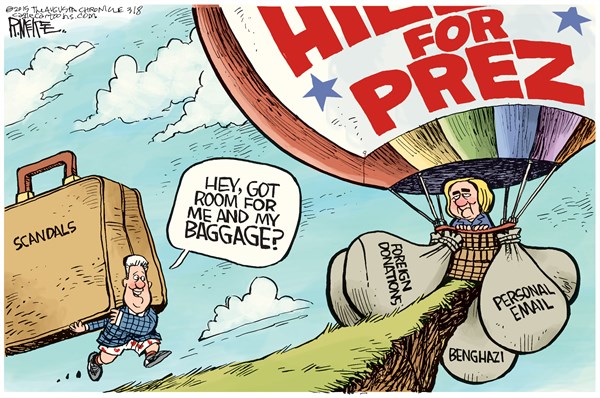
Thanks to Donald Trump's critics, we know why he would have difficulty governing the country. He's inexperienced. He's hotheaded. He's narcissistic. But what about Hillary Clinton? If elected president, could she govern effectively?
In her case, governing would not come easily, and that's putting it mildly. She's been a senator, secretary of state, and first lady, all important posts. But they don't involve actual governing-that is, making firm and final decisions. And her career has left her with drawbacks as a national leader-serious, inescapable, fundamental drawbacks.
Her biggest problem is a near-total lack of credibility. One of the surest signs a president is in trouble two or three years into a term occurs when a "credibility gap" develops. What a president says is no longer believed. Clinton is unique in this regard: She would begin her presidency with a credibility gap. Even with the post-convention bump in her polling numbers last month, a Washington Post/ABC News survey found that 59 percent of adults think she isn't "honest and trustworthy."
The cachet of the presidency would improve her credibility, but the lack of trust wouldn't vanish. The scandal over her private emails and her negligence in protecting highly classified information would linger. Fresh emails would surface. Persistent questions about the Clinton Foundation, her family's acquisition of wealth, and her health would follow her into the White House.
At the heart of the credibility problem is her refusal to take responsibility. She said last week that she's never made "excuses" for her mistake in using a nonsecure email system. In truth, she's made nothing but excuses, blaming everyone except herself. My friend Jerry Leachman says, "Winners accept responsibility. Losers make excuses." This applies to Clinton.
In Harvard professor Richard Neustadt's famous book Presidential Power, he wrote, "Presidential power is the power to persuade." His book was published in 1960, but that fundamental point hasn't changed. And Hillary Clinton lacks that power. She's rarely persuasive.
Her agenda won't help, especially in pulling the economy out of the worst recovery since the Depression. In her campaign, she offers no incentives for economic growth-no tax cuts, no easing of regulatory burdens, no reliance on the private sector. Rather, she would spend billions on "infrastructure" in what she touts as "a comprehensive plan to create the next generation of good jobs." This is not a governing agenda.
Clinton would finance "the biggest investment in American infrastructure in decades" by raising taxes on individuals, investors, and corporations. There's an old saying that's relevant here: When you tax something, you get less of it. With her plan, we'd get less economic growth, which means fewer jobs and very little in wage increases.
Worse still, Clinton ignores history. Infrastructure as stimulus has been tried before. President Kennedy did so in hopes of reviving a weak economy in the early 1960s. When it failed, JFK turned to across-the-board tax cuts, which spurred an economic boom. When he announced his new policy, he used the word "incentives" five times. President Obama didn't learn the lesson. He emphasized infrastructure-roads and bridges-in his stimulus package enacted in 2009. It hasn't worked either. Yet Clinton now insists on giving it another try. Though Congress historically acquiesces to a new president's top priorities, Clinton's tax-and-spend plan is likely to be an exception to that rule. Unless Clinton defeats Trump in a landslide, which doesn't seem likely, she would face a Republican-dominated Congress. Republicans could lose 15 or so House seats and still control the chamber with Paul Ryan as speaker. Sweeping tax hikes are well outside the comfort zone of Ryan and most Republicans. Democrats have at least a 50-50 chance of capturing the Senate with a narrow majority. But their prospects for overcoming Republican filibusters would be poor. Under Minority Leader Harry Reid, Democrats have filibustered everything in sight, even blocking a nonbinding vote on Obama's nuclear deal with Iran. Republicans wouldn't be shy about returning the favor and filibustering Clinton's proposals. But what if Clinton decided to seek a compromise with Republicans, as her husband Bill often did in the 1990s? She would quickly have an angry revolt by the Democratic left on her hands, led by senators Elizabeth Warren and Bernie Sanders. In seeking the Democratic nomination, Clinton morphed into a leftist. She was probably insincere, but left-wing Democrats are poised to insist she follow through with policies and appointments to their liking. To betray the left would be risky in the extreme. At worst, her presidency would be marginalized. At best, she'd struggle to keep her administration afloat with occasional aid from Republicans.
Even without a break with the left, getting along with Democrats would be a problem. She's neither gregarious nor congenial. A trip to the Clinton White House would be like visiting an unpleasant in-law. It's not an exaggeration to say Hillary Clinton's chances of governing successfully, based on the wise exercise of presidential power, do not look promising. To succeed in the environment she would confront in 2017 and beyond would take a politician far more adroit than Clinton and blessed with natural skills she doesn't have. Might Trump have such skills? He thinks he does. He says his experience as a tough-minded businessman in a world of cutthroat competition makes him better able to govern. Could be. Comment by clicking here. Fred Barnes is Executive Editor at the Weekly Standard. 


 Contact The Editor
Contact The Editor
 Articles By This Author
Articles By This Author